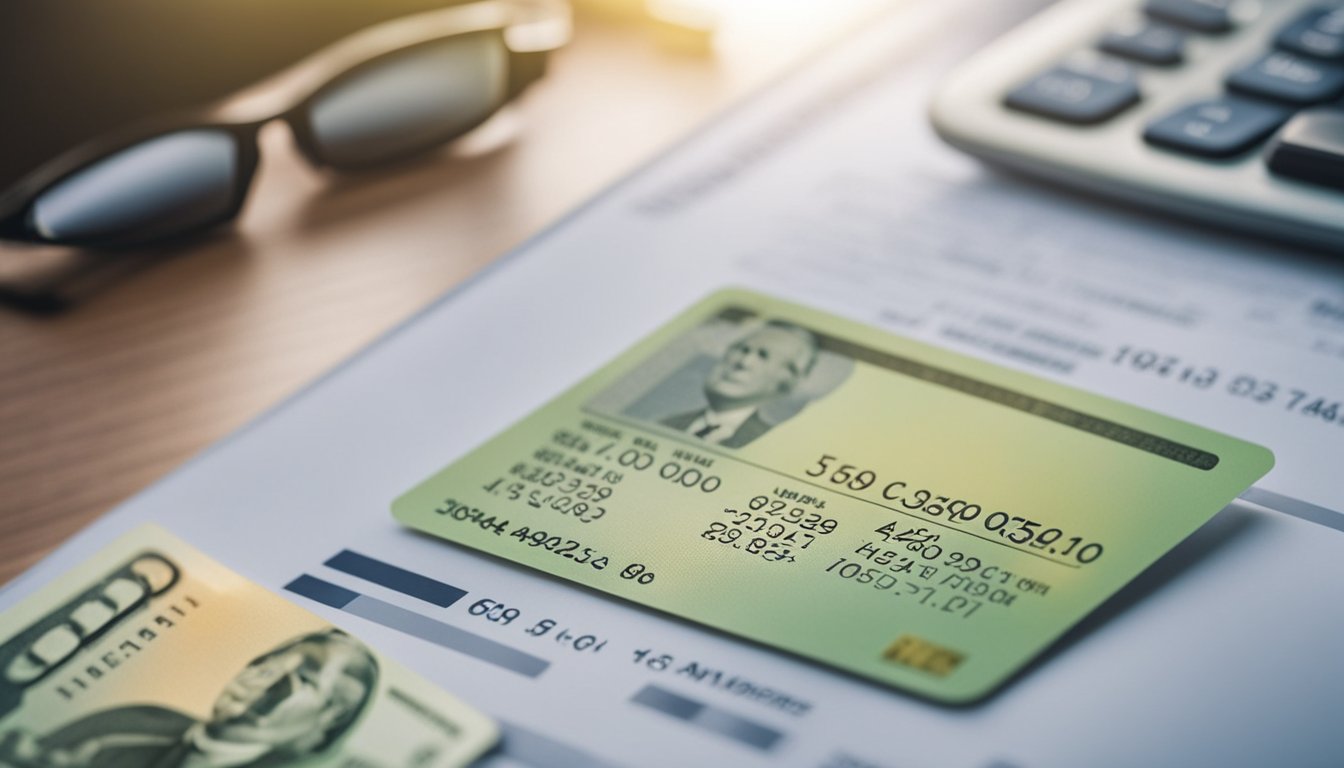If you’re planning to apply for a loan or a credit card in Singapore, you’ll want to make sure you have a good credit score. A credit score is a three-digit number that represents your creditworthiness based on your credit history. It’s an important factor that lenders use to determine whether to approve your application and what interest rate to offer you.

Having a good credit score in Singapore matters because it can make it easier for you to obtain credit and financial opportunities. A high credit score can help you qualify for lower interest rates, higher credit limits, and better loan terms. On the other hand, a low credit score can limit your options and make it more difficult to get approved for credit. Understanding how credit scores work and how to maintain a healthy credit profile is essential for anyone who wants to navigate Singapore’s economy.
Key Takeaways
- A good credit score is essential for obtaining credit and financial opportunities in Singapore
- Lenders use credit scores to determine your creditworthiness and what interest rate to offer you
- Maintaining a healthy credit profile is important for navigating Singapore’s economy
Understanding Credit Scores in Singapore

If you’re looking to apply for credit facilities such as cards or loans in Singapore, you’ll need to understand your credit score. Your credit score is a three-digit number that reflects your creditworthiness. It’s an important number that can affect your ability to get credit and the terms, fees, and interest rates you’re offered.
What Is a Credit Score?
A credit score is a number that represents your creditworthiness. It’s calculated based on your credit history, which includes information about your credit accounts, loans, and payment history. In Singapore, credit scores range from 1000 to 2000, with a higher score indicating lower credit risk.
How Are Credit Scores Calculated?
Credit scores are calculated using a variety of factors, including payment history, the amount of credit owed, the length of credit history, types of credit in use, and new credit applications. These factors are used to determine your credit risk and assign you a risk grade.
In Singapore, the Credit Bureau of Singapore (CBS) is the main credit bureau that collects credit information from various sources, including banks and financial institutions. CBS then uses this information to calculate your credit score.
Credit Bureau of Singapore
The Credit Bureau of Singapore (CBS) is a credit bureau that collects credit information from various sources, including banks and financial institutions. CBS then uses this information to calculate your credit score. Your credit report is also available to you through CBS, and you can request a copy of it for a fee.
It’s important to regularly check your credit report to ensure that all the information is accurate and up to date. If you notice any errors or discrepancies, you should report them to CBS as soon as possible.
Overall, understanding your credit score is an important part of managing your finances in Singapore. By maintaining a good credit score, you can increase your chances of getting approved for credit facilities and getting better terms, fees, and interest rates.
The Importance of a Good Credit Score

Having a good credit score is crucial in Singapore as it can affect your ability to obtain loans, credit cards, and even housing loans. In this section, we will explore the different ways a good credit score can impact your finances.
Loan Approval and Interest Rates
When you apply for a personal loan, home loan, or renovation loan, banks will review your credit score to assess your creditworthiness. A good credit score can increase your chances of loan approval and help you secure a lower interest rate. This means that you can save money on interest payments over the loan period and have more affordable monthly repayments.
Credit Card Applications
Credit card companies also use credit scores to evaluate your creditworthiness. A good credit score can increase your chances of getting approved for a credit card and help you qualify for better credit card deals. This includes lower interest rates, higher credit limits, and more rewards.
Housing and Renovation Loans
If you are planning to buy a house or renovate your existing property, having a good credit score is essential. Banks will review your credit score to assess your creditworthiness and determine your eligibility for a housing loan. A good credit score can help you get approved for a housing loan and secure a lower interest rate. This can save you a significant amount of money over the loan period and make your monthly repayments more affordable.
In summary, having a good credit score is crucial in Singapore if you want to obtain loans, credit cards, and housing loans. It can increase your chances of loan approval, help you qualify for better deals, and save you money on interest payments. Make sure to maintain a good credit score by paying your credit card bills on time, avoiding late payments, and keeping your credit utilization ratio low.
Impact on Financial Opportunities

Your credit score plays a crucial role in determining your financial opportunities. A good credit score can open up various financial opportunities, while a poor credit score can limit your options. In this section, we will explore how your credit score affects your financial opportunities in Singapore.
Employment Prospects
Many employers in Singapore conduct credit checks on job applicants as part of the recruitment process. A good credit score can demonstrate your financial responsibility and trustworthiness, which can increase your chances of getting hired. On the other hand, a poor credit score can raise red flags and lead to your job application being rejected.
Business and Personal Loan Eligibility
Your credit score is one of the primary factors that lenders consider when assessing your loan eligibility. A good credit score can increase your borrowing capacity and loan ceiling, which can help you secure a loan at a lower interest rate. Conversely, a poor credit score can limit your borrowing capacity and loan ceiling, making it harder to access credit.
Refinancing and Negotiating Power
If you have an existing loan, a good credit score can give you more refinancing options and negotiating power. With a good credit score, you can refinance your loan at a lower interest rate, which can help you save money in the long run. Additionally, a good credit score can give you more negotiating power when dealing with lenders, as they will view you as a low-risk borrower.
In summary, having a good credit score is crucial if you want to take advantage of various financial opportunities in Singapore. By maintaining a good credit score, you can increase your chances of getting hired, secure loans at lower interest rates, and have more negotiating power when dealing with lenders.
Maintaining a Healthy Credit Profile

Having a good credit score is essential to your financial well-being in Singapore. To maintain a healthy credit profile, you need to manage your debt and repayments, avoid default and bankruptcy, and regularly check your credit report.
Managing Debt and Repayments
One of the most important factors that affect your credit score is your payment history. It is crucial to make timely payments on your credit accounts, such as credit cards, loans, and mortgages. Late or missed payments can negatively impact your credit score and make it difficult for you to get approved for credit in the future.
To manage your debt and repayments effectively, you can create a budget to track your expenses and income. You can also consider consolidating your debts into a single loan with a lower interest rate. This can help you save money on interest and simplify your debt situation.
Avoiding Default and Bankruptcy
Defaulting on your credit accounts can have severe consequences on your credit score and financial health. When you default on your payments, your creditors can report your default records to the Credit Bureau Singapore (CBS). This can lower your credit score and make it difficult for you to get approved for credit in the future.
In extreme cases, you may have to file for bankruptcy, which can have long-term consequences on your credit score and financial situation. Bankruptcy can stay on your credit report for up to five years, and it can make it challenging for you to get approved for credit or loans during this period.
Regular Credit Report Checks
Regularly checking your credit report is essential to maintaining a healthy credit profile. You can request a free credit report from the CBS once a year, or you can sign up for a credit monitoring service to receive regular updates on your credit score and credit payment history.
By checking your credit report regularly, you can ensure that your account repayment history and credit risk are accurately reflected on your report. You can also detect any errors or fraudulent activities on your report and take action to correct them.
In conclusion, maintaining a healthy credit profile is crucial to your financial well-being in Singapore. By managing your debt and repayments, avoiding default and bankruptcy, and regularly checking your credit report, you can improve your credit score and increase your chances of getting approved for credit and loans in the future.
Rebuilding and Improving Credit Scores

If you have a poor credit score, there are steps you can take to rebuild and improve it. In this section, we’ll cover two key strategies: understanding credit counselling services and enhancing your creditworthiness.
Understanding Credit Counselling Services
Credit counselling can be a helpful resource for those struggling with their financial health. Credit counselling services can offer guidance on budgeting, debt management, and credit repair. They can also help you understand your credit report and identify areas for improvement.
When working with a credit counselling service, it’s important to choose a reputable provider. Look for organisations that are accredited by the Credit Counselling Singapore (CCS) or the Association of Credit Counseling Professionals Singapore (ACCPS). These organisations have strict standards for their members and can provide you with a list of approved providers.
Strategies for Enhancing Creditworthiness
Improving your creditworthiness is another key step in rebuilding your credit score. Here are some strategies to consider:
- Maintain a clean credit history: This means paying your bills on time and avoiding any adverse credit history, such as defaults or bankruptcies.
- Monitor your credit grade: Your credit grade is a measure of your credit exposure and delinquency presence. Understanding your credit grade can help you identify areas for improvement.
- Reduce your credit exposure: This means limiting the amount of credit you use and keeping your credit utilisation ratio low.
- Address any delinquency presence: If you have any delinquent accounts, work to bring them up to date as soon as possible.
By following these strategies and working with a credit counselling service if necessary, you can take steps towards rebuilding and improving your credit score.
The Role of Personal Financial Management

Managing your personal finances is crucial in maintaining a healthy credit score in Singapore. By effectively budgeting and saving, you can ensure that you have enough cash to cover your expenses and avoid unnecessary fees or dues. Creating a budget allows you to allocate your funds towards essential expenses and savings, helping you to avoid overspending and accumulating credit card debt.
Budgeting and Saving
Budgeting allows you to track your income and expenses, ensuring that you have enough cash to cover your monthly dues. By prioritising saving, you can build an emergency fund to handle unexpected expenses without relying on credit cards or loans. This proactive approach helps you to avoid accumulating unnecessary debt and maintain a healthy financial profile.
Responsible Use of Credit Cards and Loans
Responsible use of credit cards involves paying your bills on time, avoiding cash advances, and being mindful of your spending to maximise benefits such as cashback and air miles. By using credit cards wisely, you can build a positive credit history and improve your credit score. Additionally, being cautious with loans and understanding the associated fees and interest rates can help you avoid unnecessary debt and maintain a healthy financial position.
Navigating Credit in Singapore’s Economy

If you’re a Singaporean, it’s important to understand the ins and outs of credit in Singapore’s economy. Here are a few things to keep in mind:
Monetary Authority of Singapore’s Regulations
The Monetary Authority of Singapore (MAS) is the central bank of Singapore. It regulates financial institutions in Singapore, including banks, insurance companies, and securities firms. MAS has implemented several regulations to ensure that financial institutions in Singapore operate in a safe and sound manner.
One such regulation is the Total Debt Servicing Ratio (TDSR). The TDSR is a framework that limits the amount of debt that you can take on relative to your income. This is to ensure that you don’t take on too much debt and end up in financial trouble.
Understanding Credit-Related Laws and Rights
It’s important to understand credit-related laws and your rights as a borrower in Singapore. The Moneylenders Act regulates licensed moneylenders in Singapore. Under this act, licensed moneylenders are not allowed to charge more than 4% interest per month on loans.
If you’re borrowing from a bank or financial institution, you should be aware of the terms and conditions of your loan. Make sure you understand the interest rate, repayment period, and any fees associated with the loan.
If you’re purchasing a home, you may be eligible for a Housing Development Board (HDB) loan. HDB loans are provided by the government and are designed to help Singaporeans purchase a home. You can also use your Central Provident Fund (CPF) savings to pay for your home.
Overall, it’s important to be aware of the regulations and laws surrounding credit in Singapore. Make sure you understand your rights as a borrower and the terms and conditions of any loan you take out.
Practical Tips for Singaporeans

Having a good credit score is important for any Singaporean who wants to apply for credit facilities such as credit cards, loans, mortgages, and car loans. Here are some practical tips to help you maintain a good credit score:
Handling Credit Card and Loan Applications
When applying for credit cards or loans, it’s important to only apply for credit that you need. Applying for too much credit at once can have a negative impact on your credit score, especially if you have an immature credit history. Make sure you only apply for credit that you can afford to repay.
It’s also important to pay your credit card bills and loan repayments on time. Delinquency can negatively impact your credit score, and it can take some time to recover from missed payments. If you’re having trouble making payments, contact your credit provider to discuss your options.
Planning for Major Loans and Mortgages
When planning for major loans and mortgages, it’s important to consider your available credit and your assets. Your credit rating and credit score will play a big role in determining the terms and interest rates you’ll be offered. Make sure you have a good credit score before applying for a major loan or mortgage.
It’s also important to avoid making too many enquiries about loans or mortgages. Enquiries can show up on your credit report and can negatively impact your credit score. Instead, do your research online or through soft copy brochures before making any loan application.
By following these practical tips, you can maintain a good credit score and improve your chances of being approved for credit facilities in Singapore.
Conclusion

In conclusion, maintaining a healthy credit score is extremely important in Singapore. Your credit score is an indicator of your financial trustworthiness and ability to meet your debt obligations, which is why financial institutions in Singapore use it to assess your creditworthiness. This may help you to apply for credit facilities such as cards and loans. It might also affect the terms, fees, and interest rates you are offered.
By maintaining a healthy credit score, you greatly increase the amount of credit you have access to, as well as decrease the amount of money in terms of interest you will pay each month. This can help you to achieve your financial goals faster and with less stress.
To maintain a healthy credit score, it is important to practice good financial habits such as paying your bills on time, keeping your credit utilization low, and monitoring your credit report regularly. You can check your credit score digitally in Singapore from a credit bureau.
In this article, we have discussed why a good credit score in Singapore matters, the benefits of maintaining a healthy credit score, and some financial advice on how to maintain it. We hope this article has provided you with valuable information and helped you to understand the importance of having a good credit score in Singapore.
Frequently Asked Questions

How can I boost my creditworthiness in Singapore?
Improving your creditworthiness in Singapore involves adopting certain financial habits that demonstrate your ability to manage credit responsibly. Some of the things you can do include paying your bills on time, reducing your debt-to-credit ratio, and avoiding multiple credit applications within a short period. You can also consider taking out a credit facility or loan and repaying it promptly to build a positive credit history.
What benefits does a top-notch credit rating unlock for me?
A good credit score in Singapore can unlock several benefits, including access to credit facilities such as credit cards and loans with favourable terms, fees, and interest rates. It can also help you negotiate better deals and discounts on products and services such as insurance premiums, mobile phone contracts, and rental agreements. Additionally, a good credit score can improve your chances of securing rental or employment opportunities.
In what ways does a credit score impact my borrowing potential?
Your credit score is a reflection of your creditworthiness and is one of the key factors that lenders consider when assessing your borrowing potential. A high credit score indicates that you are less risky to lend to, while a low credit score suggests that you may have a higher risk of defaulting on your payments. As a result, a good credit score can increase your chances of being approved for credit facilities and loans, while a poor credit score can limit your borrowing options.
What steps should I take to swiftly enhance my credit score in Singapore?
To enhance your credit score in Singapore, you can start by reviewing your credit report to identify any errors or discrepancies that could be negatively impacting your score. You can also pay your bills on time, reduce your debt-to-credit ratio, and avoid applying for multiple credit facilities within a short period. Additionally, you can consider taking out a credit facility or loan and repaying it promptly to build a positive credit history.
Where can I check my credit score in Singapore without cost?
You can check your credit score in Singapore for free from a credit bureau such as Credit Bureau Singapore (CBS). CBS collects and aggregates information to provide borrowers’ total credit risk profile to financial institutions. You can request a copy of your credit report from CBS by visiting their website or contacting them directly.
How do various financial habits influence my credit score?
Several financial habits can influence your credit score in Singapore, including paying your bills on time, keeping your credit utilization ratio low, avoiding multiple credit applications within a short period, and maintaining a positive credit history. Conversely, defaulting on payments, carrying high levels of debt, and having a negative credit history can lower your credit score.

